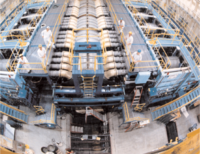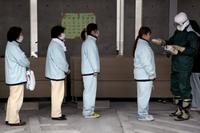-
Detroit police disarm IED found in restaurant
On Sunday, an improvised explosive device was found in the restroom of a Detroit restaurant; police confirmed that it was a bomb and successfully disarmed it
-
-
FutureSentry, Sun Surveillance offer solar-powered intrusion detection
Two companies join forces to offer solar-powered automated intrusion detection systems for areas with limited power; the solution enables a cost-effective deployment as there is no need to trench and pull video cable and power, saving on both installation cost and time
-
-
Laser device detects IEDs

Researchers have developed a laser that could detect roadside bombs — the deadliest enemy weapon U.S. and coalition soldiers encountered in Iraq and Afghanistan; the laser, which has comparable output to a simple presentation pointer, potentially has the sensitivity and selectivity to canvas large areas and detect improvised explosive devices
-
-
Children no longer have to remove shoes at airports

DHS Secretary Janet Napolitano said that her agency is changing its airport security policy for children twelve years and younger who will no longer be required to remove their shoes at airport checkpoints; in addition, Napolitano said the agency’s new policies seek to avoid pat downs for children by using other screening techniques
-
-
Two radiation generators help protect U.S.

One aspect of a nuclear explosion— the electro-magnetic pulse, or EMP — was much discussed during the cold war: scientists argued that exploding a nuclear bomb in the skies high above the United States would create an EMP which would disrupt electronic equipment and paralyze the nation; two remarkable pulsed-power machines used to test the U.S. defenses against atomic weapons have surpassed milestones at Sandia National Laboratories
-
-
Using breath and sweat to detect trapped disaster victims
Molecules in breath, sweat, and skin have been used by researchers to detect humans in a simulation of a collapsed building, offering the prospect of portable sensors for use in real-life situations, such as the devastating aftermath of devastating disasters
-
-
New materials hold promise for better detection of nuclear weapons
Researchers have developed new materials that can detect hard radiation, a very difficult thing to do; the method could lead to a hand-held device for detecting nuclear weapons and materials, such as a “nuclear bomb in a suitcase” scenario
-
-
Detecting contraband radioactive material
Researchers are building a highly sensitive instrument that will detect illicit radioactive materials with pinpoint accuracy from a safe distance; such materials, located in shipping ports, train stations, truck stops, or warehouses, potentially could be used to make dirty bombs or associated with a nuclear device itself
-
-
Sector Report for Monday, 12 September 2011: Detection
This report contains the following stories.
Plus 1 additional story.
-
-
University lab focuses on deadly natural biological agents
In the decade since the Center for Biological Defense at the University of South Florida opened, the research facility has shifted its focus from man-made biological agents to detecting natural biological threats
-
-
$1.1 million order for Implant Sciences' portable explosives detectors
Implant Sciences Corporation, a developer of explosives detection technology, recently announced that it had received a $1.1 million order for its portable explosives detection systems; with the latest purchase, Implant Sciences will supply its Quantum Sniffer QS H-150 portable devices to the Middle East for use by critical infrastructure operators
-
-
General Dynamics to integrate CBRN device in Army radios
General Dynamics C4 Systems announced last week that it will work with U.S. Army researchers to install wireless-networking chips on radios that can also detect the presence of dangerous chemicals on the battlefield
-
-
TSA: Aviation security "stronger and more secure" ten years later
Lisa Farbstein, a spokesperson for the Transportation Security Administration (TSA); discusses new technologies implemented by TSA and DHS and the agency’s shift to a more risk-based approach to passenger screening
-
-
Innovative plastic slashes cost of radiation detectors

Japan’s Teijin Chemicals announced it will begin supplying scintirex, an innovative low-cost radiation-fluorescent plastic, in late September; scintirex will be used in scintillators — the material at the core of radioactive radiation detectors; the use of the new plastic will slash the production cost of scintillators to one tenth or less of current levels
-
-
Microbes clean up nuclear waste -- and generate electricity
Researchers have discovered how microbes generate electricity while cleaning up nuclear waste and other toxic metals; the microbes effectively immobilize the radioactive material and prevent it from leaching into groundwater; the discovery could benefit sites changed forever by nuclear contamination
-
- All
- Regional
- Water
- Biometrics
- Borders/Immig
- Business
- Cybersecurity
- Detection
- Disasters
- Government
- Infrastructure
- International
- Public health
- Public Safety
- Communication interoperabillity
- Emergency services
- Emergency medical services
- Fire
- First response
- IEDs
- Law Enforcement
- Law Enforcement Technology
- Military technology
- Nonlethal weapons
- Nuclear weapons
- Personal protection equipment
- Police
- Notification /alert systems
- Situational awareness
- Weapons systems
- Sci-Tech
- Sector Reports
- Surveillance
- Transportation
Advertising & Marketing: advertise@newswirepubs.com
Editorial: editor@newswirepubs.com
General: info@newswirepubs.com
2010-2011 © News Wire Publications, LLC News Wire Publications, LLC
220 Old Country Road | Suite 200 | Mineola | New York | 11501
Permissions and Policies
Editorial: editor@newswirepubs.com
General: info@newswirepubs.com
2010-2011 © News Wire Publications, LLC News Wire Publications, LLC
220 Old Country Road | Suite 200 | Mineola | New York | 11501
Permissions and Policies
